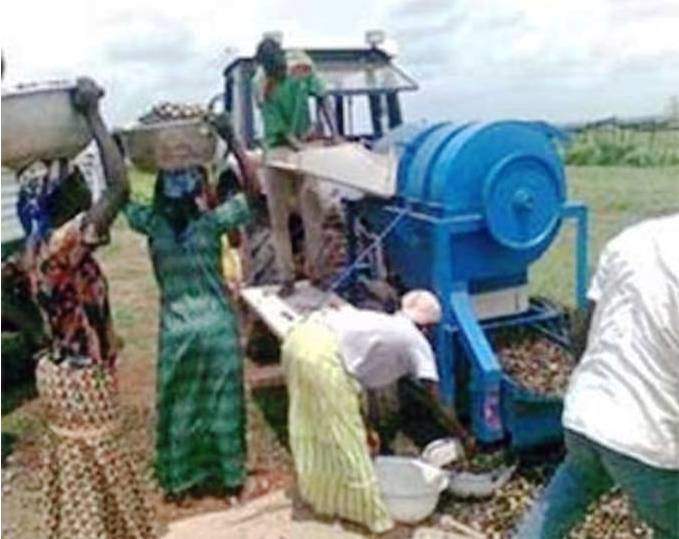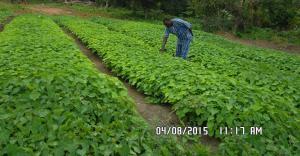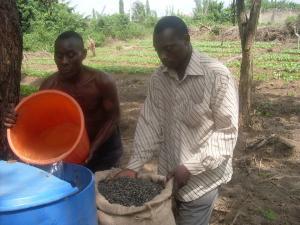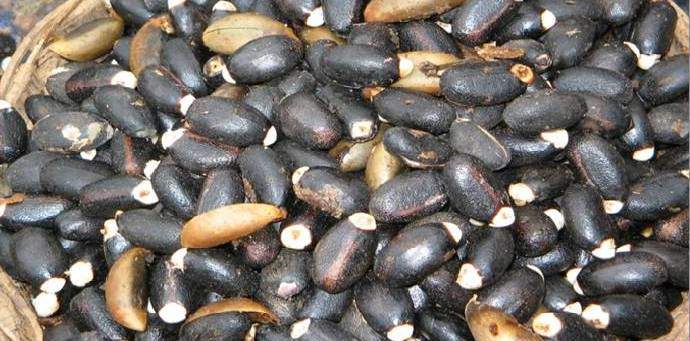by Theophilus Kumah* (Advanced Biofuels USA) With the issue of biofuels and renewable energy making waves all over the globe, it is therefore not surprising when Africa (particularly Ghana) is not left out on investing in the future of energy. Biomass is the primary source of energy in African countries, used mostly as wood fuel and charcoal for home cooking, lighting and heating. However, liquid biofuels, such as ethanol, biodiesel and straight vegetable oil (SVO) account for a small share of the supplies.[1]
 Women in Northern Ghana processing jatropha for oil to power multifunctional platform used in shea butter processing. Photo Source: Modern Ghana; by Daily Guide, 2009
Women in Northern Ghana processing jatropha for oil to power multifunctional platform used in shea butter processing. Photo Source: Modern Ghana; by Daily Guide, 2009
In Ghana, wood fuels in the form of charcoal and firewood constitute more than 70 per cent of primary energy sources while crude oil and hydro take the remaining less than 30 percent.
Biofuels have a wide range of sources from food supply crops (first generation sources) to non-food supply (second generation sources). This article focuses on one of the second generation sources which shows some of the greatest potential: Jatropha (Jatropha curcas L.)
Jatropha (Jatropha Curcas L.) which belongs to the Euphorbiaceae family, originates from Central America but can now be found throughout the tropics, including Africa and Asia. The jatropha plant can grow in wastelands and grows on any terrain, even on gravelly, sandy and saline soils. It is known to thrive in poor and stony soils, although new research suggests that the plant’s ability to adapt to these conditions is not as extensive as stated earlier. Jatropha plant is normally used as an ornamental for its continuously blossoming crimson flowers. It is also important to note that jatropha seeds are considered toxic as they contain toxalbumin curcin, which is very poisonous and inhibits protein synthesis.
Considering its socio-economic benefits as a fuel, jatropha could be more economical when grown on commercial plantation scale than when cultivated on small plots. Some factors that influence seed yield are soil fertility, climatic conditions, irrigation, cultivation methods and farm management practices. This shows that when adequate attention is given to commercial plantation scale cultivation of jatropha as compared to just growing it commonly, one can be assured of a higher seed yield. For example, a hectare of jatropha plantation is reported to yield 2.5-3.5 tonnes of seeds in the third year and the yield increases sharply to 5000-12,000 tonnes per hectare from the sixth year onwards.[2] Correspondingly, the seeds have an oil yield of between 1-4 tonnes/ hectare when rain fed and 2.5-12 tonnes/ hectare when irrigated.
In terms of the economic worth, an analysis was conducted with a comparison between jatropha oil and kerosene in Ghana in 2010. Whilst the costs of jatropha oil and kerosene were estimated to be US$0.085/liter and US$1.23/liter respectively, the cost of biodiesel from jatropha oil and petroleum diesel were estimated at US$0.99/liter and US$1.21/liter respectively.[3]
So the question remains: With so much potential, why is jatropha struggling to reach the high expectations as a biofuel source?
Opportunities for the use of Jatropha
General factors which hinder the use of fossil fuels like depletion of easily accessible oil supplies; higher cost of extracting oil from deep oceans; rapid growth in demand for energy in developing countries; concerns over global climate change as well as desire for increased energy have paved way for biofuels to receive the attention it deserves.
 Women in Northern Ghana manually extracting oil from Jatropha seeds. Photo: Sabina Anokye Mensah 2009
Women in Northern Ghana manually extracting oil from Jatropha seeds. Photo: Sabina Anokye Mensah 2009
In Ghana, jatropha is already being cultivated in the Northern part of the country. Women from this part of the country engaged in shea butter production, use jatropha oil in place of diesel in the multi-functional platforms (MFPs) comprising shea butter press, dehuller and the mill. Since it’s quite cheaper to use jatropha oil in these MFPs, commercial cultivation of jatropha and subsequent extraction of the oil for such purposes are done in the rural northern Ghana to empower women in the area of job creation.[4]
According to the United Nations Food and Agriculture Organization, sub-Saharan Africa has more than 1 billion hectares of land with potential for rain-fed crop production.[5] Jatropha cultivation on a commercial scale, considering the available hectares of land, could provide prospects of a new cash crop for farmers, increased employment in rural areas, reduced fuel import costs, and foreign exchange earnings.
Jatropha, used to produce biodiesel, could be ranked the second most popular biofuel source behind sugarcane used to produce ethanol. Owing to the popularity of sugarcane in Brazil, there is a well-established technology for producing ethanol which could be adopted by any investor in Africa. On the same basis, different technologies for the production of biodiesel from jatropha are in the pipeline and likewise any potential investor could be confident when adopting those processes.
Challenges Associated with the Use of Jatropha
It is more expensive to produce biofuels in general than to produce petroleum derived fuels. To bring parity between the costs of producing biofuels and the cost of producing petroleum derived products some authors have suggested the removal of all subsidies on petroleum derived fuels whiles others have argued for the introduction of subsidies and incentives on biofuel production.
Other challenges that might arise are the environmental impact of expanded crop production and manufacturing of biofuels, the land use conflicts that arise from expanded crop production, and the need for government support to smallholders so they can participate in and benefit from expanded biofuel production. When these challenges are adequately handled, the potential of jatropha as biofuel could be maximized.
Policy Framework
It is interesting to note that Ghana has an energy policy which could provide the backing the biofuel industry needs to excel.
The Strategic National Energy Policy (SNEP) on the development of biofuels followed recommendations made by the Biofuels Committee was set up in 2005.[6] Among their recommendations were:
- 20 per cent of national gasoline consumption replaced with biodiesel by 2015
- 30 per cent of national kerosene consumption replaced with jatropha oil by 2015
- Removal of institutional barriers
It is important to note that biodiesel and jatropha are the only biofuels that were mentioned in the policy. It is therefore necessary for legislators to mention the other biofuels like bioethanol, biogas, etc. to widen the scope of the policy.
SNEP[7] may have considered the recommendations too ambitious and therefore adopted the following targets:
- 10 per cent penetration of liquid fuels by renewable and alternative fuel by 2015 expanding to reach 20 per cent by 2020
- To become self-sufficient in petroleum products by 2015 and net exporter by 2020
In order to achieve the target of 10 and 20 per cent substitution of liquid fuels by 2015 and 2030 respectively, a road map was drawn to introduce B5 (a mixture of 5 per cent biodiesel and 95 per cent diesel) and E10 (a mixture of 10 per cent ethanol and 90 per cent petrol) onto the market by the end of 2008 but this target is under review.
One can say the deadlines in the policy were not adhered to. However, there is no doubt that the content of the policy would be a good start for the country to receive its fair share of the new revolution.
 Oladunjoye A. Waleola at the Jatropha nursery site in Oyo State, Nigeria. Photo: OA Waleola (04/08/2015).
Oladunjoye A. Waleola at the Jatropha nursery site in Oyo State, Nigeria. Photo: OA Waleola (04/08/2015).
Nigerian Example
Nigerian National Petroleum Corporation (NNPC) is making plans to commence large scale commercial biofuel venture where jatropha is going to be cultivated along the borders of over 5,000 km of NNPC pipelines across the country[8]. Nigeria, one of Ghana’s peer countries, is setting the pace for the rest of sub-Saharan Africa to follow.
It is recommended that if Jatropha should get the same level of attention given to ethanol from sugarcane or lignocellulosic biomass, jatropha could be extracted in commercial quantities. Its commercial production could then propel Ghana to make significant strides in the biofuel sector as spelt out in its energy policy.
 From L-R Mr. Kehinde (Field Worker) and Mr. Oladunjoye A. Waleola(M.D) Avandith Renewable Energy Ltd. Nig. During soaking of Jatropha seeds in readiness for planting at Oyo State. Photo: OA Waleola (26/01/2009).
From L-R Mr. Kehinde (Field Worker) and Mr. Oladunjoye A. Waleola(M.D) Avandith Renewable Energy Ltd. Nig. During soaking of Jatropha seeds in readiness for planting at Oyo State. Photo: OA Waleola (26/01/2009).
[1] Mitchell D., Biofuels in Africa :Opportunities, Prospects and Challenges
[2] Henning R. K., Combating Desertification: The Jatropha project in Mali, West Africa
[3] Ofori-Boateng C., Lee K. T., Feasibility of Jatropha oil for biodiesel: Economic Analysis
[4] [4] Ofori-Boateng C., Lee K. T., Feasibility of Jatropha oil for biodiesel: Economic Analysis and Mensah, Sabina Anokye, Jatropha Oil Production as Biofuel for Shea Butter Processing Machine in Ghana: Quality Characteristics and Storability of the Derived
Shea Butter (Doctoral Thesis) See also: http://en.calameo.com/books/001423804df2e59206018
[5] FAO (Food and Agriculture Organization). 2008. The State of Food and Agriculture 2008: Biofuels: Prospects, Risks and Opportunities. Rome: FAO.
[6] Energy Policy Act of 2005, Public Law 109-58-August 8, 2005
[7] Energy Commission, Strategic National Energy Plan 2006-2020 and Ghana Energy Policy, Main
Version, Energy Commission, 2006
[8] Read full story www.advanvedbiofuelsusa.info/nnpc-to-commence-commercial-bio-fuel-project-in-nigeria-says-gmd/ and https://advancedbiofuelsusa.info/benefits-and-ordeals-of-a-biofuel-project-in-nigeria/
*Theophilus Kumah brings his chemical engineering degree from Ghana’s Kwame Nkrumah University of Science and Technology and his interest in innovations for biofuels in Ghana to serve as a researcher and writer for Advanced Biofuels USA.
Nearly 55,000 articles in our online library!
Use the categories and tags listed below to access the nearly 50,000 articles indexed on this website.
Advanced Biofuels USA Policy Statements and Handouts!
- For Kids: Carbon Cycle Puzzle Page
- Why Ethanol? Why E85?
- Just A Minute 3-5 Minute Educational Videos
- 30/30 Online Presentations
- “Disappearing” Carbon Tax for Non-Renewable Fuels
- What’s the Difference between Biodiesel and Renewable (Green) Diesel? 2020 revision
- How to De-Fossilize Your Fleet: Suggestions for Fleet Managers Working on Sustainability Programs
- New Engine Technologies Could Produce Similar Mileage for All Ethanol Fuel Mixtures
- Action Plan for a Sustainable Advanced Biofuel Economy
- The Interaction of the Clean Air Act, California’s CAA Waiver, Corporate Average Fuel Economy Standards, Renewable Fuel Standards and California’s Low Carbon Fuel Standard
- Latest Data on Fuel Mileage and GHG Benefits of E30
- What Can I Do?
Donate
DonateARCHIVES
- February 2026
- January 2026
- December 2025
- November 2025
- October 2025
- September 2025
- August 2025
- July 2025
- June 2025
- May 2025
- April 2025
- March 2025
- February 2025
- January 2025
- December 2024
- November 2024
- October 2024
- September 2024
- August 2024
- July 2024
- June 2024
- May 2024
- April 2024
- March 2024
- February 2024
- January 2024
- December 2023
- November 2023
- October 2023
- September 2023
- August 2023
- July 2023
- June 2023
- May 2023
- April 2023
- March 2023
- February 2023
- January 2023
- December 2022
- November 2022
- October 2022
- September 2022
- August 2022
- July 2022
- June 2022
- May 2022
- April 2022
- March 2022
- February 2022
- January 2022
- December 2021
- November 2021
- October 2021
- September 2021
- August 2021
- July 2021
- June 2021
- May 2021
- April 2021
- March 2021
- February 2021
- January 2021
- December 2020
- November 2020
- October 2020
- September 2020
- August 2020
- July 2020
- June 2020
- May 2020
- April 2020
- March 2020
- February 2020
- January 2020
- December 2019
- November 2019
- October 2019
- September 2019
- August 2019
- July 2019
- June 2019
- May 2019
- April 2019
- March 2019
- February 2019
- January 2019
- December 2018
- November 2018
- October 2018
- September 2018
- August 2018
- July 2018
- June 2018
- May 2018
- April 2018
- March 2018
- February 2018
- January 2018
- December 2017
- November 2017
- October 2017
- September 2017
- August 2017
- July 2017
- June 2017
- May 2017
- April 2017
- March 2017
- February 2017
- January 2017
- December 2016
- November 2016
- October 2016
- September 2016
- August 2016
- July 2016
- June 2016
- May 2016
- April 2016
- March 2016
- February 2016
- January 2016
- December 2015
- November 2015
- October 2015
- September 2015
- August 2015
- July 2015
- June 2015
- May 2015
- April 2015
- March 2015
- February 2015
- January 2015
- December 2014
- November 2014
- October 2014
- September 2014
- August 2014
- July 2014
- June 2014
- May 2014
- April 2014
- March 2014
- February 2014
- January 2014
- December 2013
- November 2013
- October 2013
- September 2013
- August 2013
- July 2013
- June 2013
- May 2013
- April 2013
- March 2013
- February 2013
- January 2013
- December 2012
- November 2012
- October 2012
- September 2012
- August 2012
- July 2012
- June 2012
- May 2012
- April 2012
- March 2012
- February 2012
- January 2012
- December 2011
- November 2011
- October 2011
- September 2011
- August 2011
- July 2011
- June 2011
- May 2011
- April 2011
- March 2011
- February 2011
- January 2011
- December 2010
- November 2010
- October 2010
- September 2010
- August 2010
- July 2010
- June 2010
- May 2010
- April 2010
- March 2010
- February 2010
- January 2010
- December 2009
- November 2009
- October 2009
- September 2009
- August 2009
- July 2009
- June 2009
- May 2009
- April 2009
- March 2009
- February 2009
- January 2009
- December 2008
- November 2008
- October 2008
- September 2008
- August 2008
- July 2008
- June 2008
- May 2008
- April 2008
- March 2008
- February 2008
- January 2008
- December 2007
- November 2007
- October 2007
- September 2007
- August 2007
- June 2007
- February 2007
- January 2007
- October 2006
- April 2006
- January 2006
- April 2005
- December 2004
- November 2004
- December 1987
CATEGORIES
- About Us
- Advanced Biofuels Call to Action
- Aviation Fuel/Sustainable Aviation Fuel (SAF)
- BioChemicals/Renewable Chemicals
- BioRefineries/Renewable Fuel Production
- Business News/Analysis
- Cooking Fuel
- Education
- 30/30 Online Presentations
- Competitions, Contests
- Earth Day 2021
- Earth Day 2022
- Earth Day 2023
- Earth Day 2024
- Earth Day 2025
- Executive Training
- Featured Study Programs
- Instagram TikTok Short Videos
- Internships
- Just a Minute
- K-12 Activities
- Mechanics training
- Online Courses
- Podcasts
- Scholarships/Fellowships
- Teacher Resources
- Technical Training
- Technician Training
- University/College Programs
- Events
- Coming Events
- Completed Events
- More Coming Events
- Requests for Speakers, Presentations, Posters
- Requests for Speakers, Presentations, Posters Completed
- Webinars/Online
- Webinars/Online Completed; often available on-demand
- Federal Agency/Executive Branch
- Agency for International Development (USAID)
- Agriculture (USDA)
- Commerce Department
- Commodity Futures Trading Commission
- Congressional Budget Office
- Defense (DOD)
- Air Force
- Army
- DARPA (Defense Advance Research Projects Agency)
- Defense Logistics Agency
- Marines
- Navy
- Education Department
- Energy (DOE)
- Environmental Protection Agency
- Federal Energy Regulatory Commission (FERC)
- Federal Reserve System
- Federal Trade Commission
- Food and Drug Administration
- General Services Administration
- Government Accountability Office (GAO)
- Health and Human Services (HHS)
- Homeland Security
- Housing and Urban Development (HUD)
- Interior Department
- International Trade Commission
- Joint Office of Energy and Transportation
- Justice (DOJ)
- Labor Department
- National Academies of Sciences Engineering Medicine
- National Aeronautics and Space Administration
- National Oceanic and Atmospheric Administration
- National Research Council
- National Science Foundation
- National Transportation Safety Board (NTSB)
- Occupational Safety and Health Administration
- Overseas Private Investment Corporation
- Patent and Trademark Office
- Securities and Exchange Commission
- State Department
- Surface Transportation Board
- Transportation (DOT)
- Federal Aviation Administration
- National Highway Traffic Safety Administration (NHTSA)
- Pipeline and Hazardous Materials Safety Admin (PHMSA)
- Treasury Department
- U.S. Trade Representative (USTR)
- White House
- Federal Legislation
- Federal Litigation
- Federal Regulation
- Feedstocks
- Agriculture/Food Processing Residues nonfield crop
- Alcohol/Ethanol/Isobutanol
- Algae/Other Aquatic Organisms/Seaweed
- Atmosphere
- Carbon Dioxide (CO2)
- Field/Orchard/Plantation Crops/Residues
- Forestry/Wood/Residues/Waste
- hydrogen
- Manure
- Methane/Biogas
- methanol/bio-/renewable methanol
- Not Agriculture
- RFNBO (Renewable Fuels of Non-Biological Origin)
- Seawater
- Sugars
- water
- Funding/Financing/Investing
- grants
- Green Jobs
- Green Racing
- Health Concerns/Benefits
- Heating Oil/Fuel
- History of Advanced Biofuels
- Infrastructure
- Aggregation
- Biofuels Engine Design
- Biorefinery/Fuel Production Infrastructure
- Carbon Capture/Storage/Use
- certification
- Deliver Dispense
- Farming/Growing
- Precursors/Biointermediates
- Preprocessing
- Pretreatment
- Terminals Transport Pipelines
- International
- Abu Dhabi
- Afghanistan
- Africa
- Albania
- Algeria
- Angola
- Antarctica
- Arctic
- Argentina
- Armenia
- Aruba
- Asia
- Asia Pacific
- Australia
- Austria
- Azerbaijan
- Bahamas
- Bahrain
- Bangladesh
- Barbados
- Belarus
- Belgium
- Belize
- Benin
- Bermuda
- Bhutan
- Bolivia
- Bosnia and Herzegovina
- Botswana
- Brazil
- Brunei
- Bulgaria
- Burkina Faso
- Burundi
- Cambodia
- Cameroon
- Canada
- Canary Islands
- Caribbean
- Central African Republic
- Central America
- Chad
- Chile
- China
- Colombia
- Congo
- Congo, Democratic Republic of
- Costa Rica
- Croatia
- Cuba
- Cyprus
- Czech Republic
- Denmark
- Dominican Republic
- Dubai
- Ecuador
- Egypt
- El Salvador
- Equatorial Guinea
- Estonia
- Eswatini/Swaziland
- Ethiopia
- European Union (EU)
- Fiji
- Finland
- France
- French Guiana
- Gabon
- Georgia
- Germany
- Ghana
- Global South
- Greece
- Greenland
- Grenada
- Guatemala
- Guinea
- Guyana
- Haiti
- Honduras
- Hong Kong
- Hungary
- Iceland
- India
- Indonesia
- Iran
- Iraq
- Ireland
- Israel
- Italy
- Ivory Coast
- Jamaica
- Japan
- Jersey
- Jordan
- Kazakhstan
- Kenya
- Korea
- Kosovo
- Kuwait
- Laos
- Latin America
- Latvia
- Lebanon
- Liberia
- Lithuania
- Luxembourg
- Macedonia
- Madagascar
- Malawi
- Malaysia
- Maldives
- Mali
- Malta
- Marshall Islands
- Mauritania
- Mauritius
- Mexico
- Middle East
- Moldova
- Monaco
- Mongolia
- Morocco
- Mozambique
- Myanmar/Burma
- Namibia
- Nepal
- Netherlands
- New Guinea
- New Zealand
- Nicaragua
- Niger
- Nigeria
- North Africa
- North America
- North Korea
- Northern Ireland
- Norway
- Oman
- Pakistan
- Panama
- Papua New Guinea
- Paraguay
- Peru
- Philippines
- Poland
- Portugal
- Qatar
- Republic of
- Romania
- Russia
- Rwanda
- Saudi Arabia
- Scotland
- Senegal
- Serbia
- Sierra Leone
- Singapore
- Slovakia/Slovak Republic
- Slovenia
- Solomon Islands
- South Africa
- South America
- South Korea
- South Sudan
- Southeast Asia
- Spain
- Sri Lanka
- Sudan
- Suriname
- Sweden
- Switzerland
- Taiwan
- Tanzania
- Thailand
- Timor-Leste
- Togo
- Trinidad and Tobago
- Tunisia
- Turkey
- Uganda
- UK (United Kingdom)
- Ukraine
- United Arab Emirates UAE
- Uruguay
- Uzbekistan
- Vatican
- Venezuela
- Vietnam
- Wales
- Zambia
- Zanzibar
- Zimbabwe
- Marine/Boat Bio and Renewable Fuel/MGO/MDO/SMF
- Marketing/Market Forces and Sales
- Opinions
- Organizations
- Original Writing, Opinions Advanced Biofuels USA
- Policy
- Presentations
- Biofuels Digest Conferences
- DOE Conferences
- Bioeconomy 2017
- Bioenergy2015
- Biomass2008
- Biomass2009
- Biomass2010
- Biomass2011
- Biomass2012
- Biomass2013
- Biomass2014
- DOE Project Peer Review
- Other Conferences/Events
- R & D Focus
- Carbon Capture/Storage/Use
- Co-Products
- Feedstock
- Logistics
- Performance
- Process
- Vehicle/Engine/Motor/Aircraft/Boiler/Ship
- Yeast
- Railroad/Train/Locomotive Fuel
- Resources
- Books Web Sites etc
- Business
- Definition of Advanced Biofuels
- Find Stuff
- Government Resources
- Scientific Resources
- Technical Resources
- Tools/Decision-Making
- Rocket/Missile Fuel
- Sponsors
- States
- Alabama
- Alaska
- Arizona
- Arkansas
- California
- Colorado
- Connecticut
- Delaware
- Florida
- Georgia
- Hawai'i
- Idaho
- Illinois
- Indiana
- Iowa
- Kansas
- Kentucky
- Louisiana
- Maine
- Maryland
- Massachusetts
- Michigan
- Midwest
- Minnesota
- Mississippi
- Missouri
- Montana
- Native American tribal nation lands
- Nebraska
- Nevada
- New Hampshire
- New Jersey
- New Mexico
- New York
- North Carolina
- North Dakota
- Ohio
- Oklahoma
- Oregon
- Pennsylvania
- Puerto Rico
- Rhode Island
- South Carolina
- South Dakota
- Tennessee
- Texas
- Utah
- Vermont
- Virginia
- Washington
- Washington DC
- West Coast
- West Virginia
- Wisconsin
- Wyoming
- Sustainability
- Uncategorized
- What You Can Do
tags
© 2008-2023 Copyright Advanced BioFuels USA. All Rights reserved.


.jpg)





0 COMMENTS
Leave A Comment
Your Email Address wiil not be Published. Required Field Are marked*